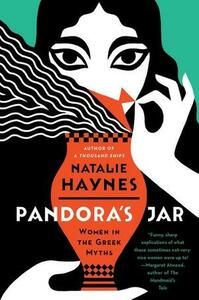You need to sign in or sign up before continuing.
Take a photo of a barcode or cover
informative
slow-paced
adventurous
challenging
emotional
informative
inspiring
medium-paced
This book tells the story of the women in many of the well known Greek stories, starting with Pandora. Each section starts with the story as most people know it today, and then the author compares the text where that story came from (usually a Renaissance or 19th century re-telling) with other "contemporary" sources.
It's absolutely fascinating. The author compares a lot of the original Greek word choices, especially when identical words were used when telling the men's stories, and how they got mistranslated along the way.
What I love is that you can hear the anger of the author building in each section. Each time she tells the story of a woman being shoved to the sidelines, ignored, or their assault downplayed you can feel the fury rising.
My other favorite but may be my favorite line in a book ever: when telling the story of Jocasta, Oedipus's mother/wife, she talks about how it's odd that most modern people associate the play with the title Oedipus Rex versus Oedipus Tyrannus, which would be the Greek title instead of Rex, which is Latin. It's double odd because most people hear Rex and think of dinosaurs, which do not feature in the story.
There's a LOT of the very English witty humor, and I enjoyed it.
This is a fascinating book that I highly recommend. You've never heard the stories like this before.
It's absolutely fascinating. The author compares a lot of the original Greek word choices, especially when identical words were used when telling the men's stories, and how they got mistranslated along the way.
What I love is that you can hear the anger of the author building in each section. Each time she tells the story of a woman being shoved to the sidelines, ignored, or their assault downplayed you can feel the fury rising.
My other favorite but may be my favorite line in a book ever: when telling the story of Jocasta, Oedipus's mother/wife, she talks about how it's odd that most modern people associate the play with the title Oedipus Rex versus Oedipus Tyrannus, which would be the Greek title instead of Rex, which is Latin. It's double odd because most people hear Rex and think of dinosaurs, which do not feature in the story.
There's a LOT of the very English witty humor, and I enjoyed it.
This is a fascinating book that I highly recommend. You've never heard the stories like this before.
funny
informative
medium-paced
hopeful
informative
reflective
slow-paced
funny
informative
lighthearted
medium-paced
informative
inspiring
medium-paced
A very interesting look at how the stories of Greek women and goddesses have been marginalised and distorted through the ages. Euripides evidently wrote very sympathetically about some of these women, but his plays have not become the dominant narrative
Happy Publication Day! (U.S.) March 29, 2022
Thanks to NetGalley and Harper Perennial for providing a digital review copy in exchange for an honest review.
My rating: 4.5⭐️
Having read and loved 'A Thousand Ships' by Natalie Haynes I was eagerly looking forward to reading 'Pandora’s Jar : Women in the Greek Myths' and I was not disappointed!
The author describes Greek myths as “protean” stating that they operate in different timelines- the one in which they are set and the timelines of the subsequent versions and retellings. Each chapter in this book is devoted to a female character from the Greek myths and the author draws from multiple sources to discuss how these characters have been presented, represented and interpreted over the years. Chapters are dedicated to Pandora, Jocasta, Helen, Medusa, The Amazons, Clytemnestra, Eurydice, Phaedra, Medea and Penelope. Popular opinion and numerous translators and interpreters have defined these women and their roles in the myths -whether regarded as famous or infamous, labeled and judged as good (Penelope) or bad (Clytemnestra) and in many cases, held responsible for events that had more powerful forces at play (Medusa, Pandora, Helen) or marginalized and relegated to the background in the role of mother or wife (Jocasta), all the while waxing eloquent about the heroic exploits of their male counterparts. But as Haynes explains it, these women are so much more than a unidimensional presence in those stories, the narrative perspectives of which may differ depending upon the writer, narrator or translator. The author provides a broad overview of how these characters have been depicted in not only literature but art, theatre, music and film and the ensuing discussion of how and why these depictions and interpretations vary makes for an absorbing read.
Haynes references the works of Hesiod, Homer, Ovid, Euripides, Aeschylus, Sophocles and other sources while also eloquently describing some surviving antiquarian artifacts and relatively newer artwork (paintings, sculptures etc) depicting the characters and scenes from the various versions of the Greek myths. The child friendly versions of the myths as presented by Nathaniel Hawthorne or Roger Lancelyn Green are also discussed in the context of how authors choose to whitewash the not-so-heroic exploits of popular heroes in order to emphasize the virtues of said character. I also enjoyed the more contemporary references interspersed in the discussions ranging from cinematic renderings such as Clash of the Titans and the more recent Wonder Woman franchise to how the myths have influenced select works of Dame Agatha Christie as well as characters and episodes from Star Trek or Buffy the Vampire Slayer and even Beyonce.
It should be noted that Pandora's Jar: Women in the Greek Myths is not a 'retelling' or 'reimagining' of the myths in the strictest terms but an insightful exploration into the different versions of the characters that have been presented through the ages. Smart, witty, engaging and brilliantly researched, Pandora’s Jar: Women in the Greek Myths by Natalie Haynes is a joy to read for fans of Greek mythology and especially those with an interest in learning more about the women in the myths. I loved the details of the art and artifacts described in each of the chapters and wished that there could have been more pictures embedded with the text. I found myself looking these up on the internet and that truly enriched my reading experience. Not only does Natalie Haynes explore how and why these women and their stories have been defined the way they have but in doing so also motivates you to question your own observations understanding of the women (and the men) in the Greek myths. While I enjoyed all the chapters in the book, I have to mention that those devoted to Pandora, Medusa and The Amazons were my favorites.
Thanks to NetGalley and Harper Perennial for providing a digital review copy in exchange for an honest review.
My rating: 4.5⭐️
Having read and loved 'A Thousand Ships' by Natalie Haynes I was eagerly looking forward to reading 'Pandora’s Jar : Women in the Greek Myths' and I was not disappointed!
The author describes Greek myths as “protean” stating that they operate in different timelines- the one in which they are set and the timelines of the subsequent versions and retellings. Each chapter in this book is devoted to a female character from the Greek myths and the author draws from multiple sources to discuss how these characters have been presented, represented and interpreted over the years. Chapters are dedicated to Pandora, Jocasta, Helen, Medusa, The Amazons, Clytemnestra, Eurydice, Phaedra, Medea and Penelope. Popular opinion and numerous translators and interpreters have defined these women and their roles in the myths -whether regarded as famous or infamous, labeled and judged as good (Penelope) or bad (Clytemnestra) and in many cases, held responsible for events that had more powerful forces at play (Medusa, Pandora, Helen) or marginalized and relegated to the background in the role of mother or wife (Jocasta), all the while waxing eloquent about the heroic exploits of their male counterparts. But as Haynes explains it, these women are so much more than a unidimensional presence in those stories, the narrative perspectives of which may differ depending upon the writer, narrator or translator. The author provides a broad overview of how these characters have been depicted in not only literature but art, theatre, music and film and the ensuing discussion of how and why these depictions and interpretations vary makes for an absorbing read.
Haynes references the works of Hesiod, Homer, Ovid, Euripides, Aeschylus, Sophocles and other sources while also eloquently describing some surviving antiquarian artifacts and relatively newer artwork (paintings, sculptures etc) depicting the characters and scenes from the various versions of the Greek myths. The child friendly versions of the myths as presented by Nathaniel Hawthorne or Roger Lancelyn Green are also discussed in the context of how authors choose to whitewash the not-so-heroic exploits of popular heroes in order to emphasize the virtues of said character. I also enjoyed the more contemporary references interspersed in the discussions ranging from cinematic renderings such as Clash of the Titans and the more recent Wonder Woman franchise to how the myths have influenced select works of Dame Agatha Christie as well as characters and episodes from Star Trek or Buffy the Vampire Slayer and even Beyonce.
It should be noted that Pandora's Jar: Women in the Greek Myths is not a 'retelling' or 'reimagining' of the myths in the strictest terms but an insightful exploration into the different versions of the characters that have been presented through the ages. Smart, witty, engaging and brilliantly researched, Pandora’s Jar: Women in the Greek Myths by Natalie Haynes is a joy to read for fans of Greek mythology and especially those with an interest in learning more about the women in the myths. I loved the details of the art and artifacts described in each of the chapters and wished that there could have been more pictures embedded with the text. I found myself looking these up on the internet and that truly enriched my reading experience. Not only does Natalie Haynes explore how and why these women and their stories have been defined the way they have but in doing so also motivates you to question your own observations understanding of the women (and the men) in the Greek myths. While I enjoyed all the chapters in the book, I have to mention that those devoted to Pandora, Medusa and The Amazons were my favorites.
challenging
dark
emotional
funny
informative
reflective
slow-paced
Soooo, I'm pretty sure I started this book before 2023 and just now got around to finishing it. I really enjoyed learning about the women in Greek myth. There were a couple I just couldn't get into (sorry Phaedra) but the author has a really unique voice and writing style combining wit with knowledge. Overall, I really enjoyed the book. I did want to hear more about Natalie's thoughts on Persephone though...maybe even Demeter or Hecate. Athene would also be cool as Athene is in a lot of "heroes"' stories, and Natalie has a somewhat disdainful view on her character. Overall, 4/5, I would reference it for articles or read excerpts on the women. There's a lot of knowledge in the book that unfortunately I don't think I can retain. Kind of wish I annotated/bookmarked a bit...oh well! Good read!
challenging
informative
inspiring
medium-paced
A voice is given to marginalised women from the Greek myths by Natalie Haynes in a much needed and very timely book.





